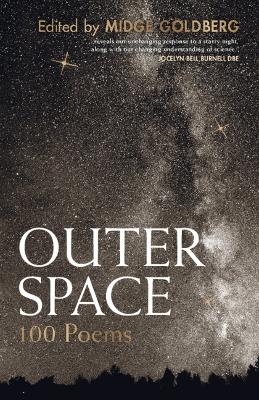
Outer Space: 100 Poems
Seiten
2022
Cambridge University Press (Verlag)
978-1-009-20360-9 (ISBN)
Cambridge University Press (Verlag)
978-1-009-20360-9 (ISBN)
Throughout human history, poetry has provided stories about what people observe in the sky. Stars, planets, comets, and space travel serve as metaphors for love, loneliness, adventure, and awe. This anthology contains poems by poets and astronomers, across time and cultures, revealing how we think about outer space, and ourselves.
Poets and astronomers often ask the same questions. Where did we come from? Why are we here? Where are we going? Throughout human history, poetry has provided stories about what people observe in the sky. Stars, planets, comets, the moon, and space travel are used as metaphors for our feelings of love, loneliness, adventurousness, and awe. This anthology includes poets, astronomers, and scientists from the 12th century BCE to today, from all around the world. Sappho, Du Fu, Hafez, and Shakespeare are joined by Gwyneth Lewis's space requiem, Tracy K. Smith on the Hubble telescope, and Charles Simic, whose poem accompanied a NASA mission. Astronomers Tycho Brahe and Edmund Halley accompany modern scientists including Rebecca Elson, Alice Gorman on the first woman in space, and Yun Wang's space journal on travel to Andromeda. This collection reaches across time and cultures to illuminate how we think about outer space, and ourselves.
Poets and astronomers often ask the same questions. Where did we come from? Why are we here? Where are we going? Throughout human history, poetry has provided stories about what people observe in the sky. Stars, planets, comets, the moon, and space travel are used as metaphors for our feelings of love, loneliness, adventurousness, and awe. This anthology includes poets, astronomers, and scientists from the 12th century BCE to today, from all around the world. Sappho, Du Fu, Hafez, and Shakespeare are joined by Gwyneth Lewis's space requiem, Tracy K. Smith on the Hubble telescope, and Charles Simic, whose poem accompanied a NASA mission. Astronomers Tycho Brahe and Edmund Halley accompany modern scientists including Rebecca Elson, Alice Gorman on the first woman in space, and Yun Wang's space journal on travel to Andromeda. This collection reaches across time and cultures to illuminate how we think about outer space, and ourselves.
Midge Goldberg has written and published three poetry collections, including, in 2021, To Be Opened After My Death. She was the recipient in 2016 of the Richard Wilbur Poetry Award for her book Snowman's Code, and, in the same year, of the Howard Nemerov Sonnet Award. Her poems have appeared in Measure, The Hopkins Review, The Atlanta Review, Poetry Speaks: Who I Am, and other national journals and anthologies, as well as on Garrison Keillor's daily podcast and newsletter The Writer's Almanac. She is a graduate of Yale University and in addition holds an MFA from University of New Hampshire.
Introduction; Poems 1-100; Acknowledgements; Biographies.
| Erscheinungsdatum | 29.09.2022 |
|---|---|
| Zusatzinfo | Worked examples or Exercises |
| Verlagsort | Cambridge |
| Sprache | englisch |
| Maße | 135 x 205 mm |
| Gewicht | 330 g |
| Themenwelt | Geisteswissenschaften ► Sprach- / Literaturwissenschaft ► Anglistik / Amerikanistik |
| Geisteswissenschaften ► Sprach- / Literaturwissenschaft ► Literaturwissenschaft | |
| Naturwissenschaften ► Physik / Astronomie ► Astronomie / Astrophysik | |
| ISBN-10 | 1-009-20360-6 / 1009203606 |
| ISBN-13 | 978-1-009-20360-9 / 9781009203609 |
| Zustand | Neuware |
| Haben Sie eine Frage zum Produkt? |
Mehr entdecken
aus dem Bereich
aus dem Bereich
Poetik eines sozialen Urteils
Buch | Hardcover (2023)
De Gruyter (Verlag)
59,95 €
Buch | Softcover (2024)
belleville (Verlag)
20,00 €


